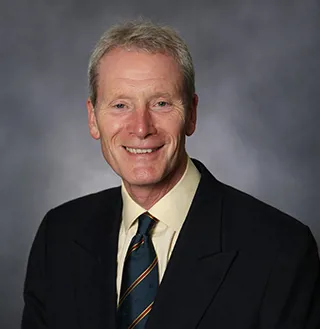From the President: Air Marshal Sir Julian Young KBE CB FREng CEng FIET
Published: Thu 14 Oct 2021
Published: Thu 14 Oct 2021
Member News spoke to Sir Julian in late August as he was preparing to take on his Presidential role for the IET:
“It’s only in more recent months that becoming President of the IET has really struck me. I recently went to RAF Odiham, where I served on my first tour as an Engineer Officer, and RAF Cosford, where I was Station Commander, to film with IET.tv for the President’s Address.
I was pleased to shine a spotlight on the technicians working there and how the RAF trains its technicians as part of their apprenticeship.”

“I’ve been involved in IET Governance for some time, serving first on the Membership and Professional Development Board, then as an elected Trustee and Vice President, and a Deputy President for the past two years.
As a passionate Engineer, I’m particularly interested in professionalisation and people development.
“I’m a big fan of our IET Strategy 2030. The societal challenges we are focusing on are incredibly important and I’d like to see our focus on sustainability, climate change, and digital embedded into everything we do.”
“The IET does so much across the board, and I want to build on the work that IET Past President Peter Bonfield laid out in his concordat.
I also don’t want to lose any of the threads laid down by immediate IET Past President Danielle George as part of our 150th anniversary year.
“The first half of my career in the RAF was spent mostly on supporting operations, which gave me clarity and a strong sense of purpose. I’ve seen the work and skill that technicians possess, and I think we can do more for technicians by concentrating on their needs and how we can best support them.
“I liken maintaining a military aircraft to a Formula 1 car. There are around 31,750 people in the RAF today, and 38% of these are technical by profession. Some 9% of these are Engineer Officers and the rest are technicians working on everything from aircraft through vehicles and hydraulic rigs to cyber.
We need to elevate the status of technicians. There are hundreds of other large industries out there with a huge workforce of technicians. Are we doing all we can for them?”
“I came to achieve CEng late in my career because I needed that badge of professionalism for my role at the time. Since then, I’ve shown others that professionalisation is a good thing to do.
“During my last six years in the MOD I was appointed the Defence Engineering Champion and had a small permanent team to assist me in this new role. We delivered Defence’s first STEM Strategy and a Professionalisation Strategy for Engineers.
The MOD has bases throughout the UK and we encouraged military and Civil Service engineering colleagues to go out and give their time to support local area STEM activities and to champion professional registration - to inspire others ‘to want to become you’. We also wanted to show that we value our technical people.
“I want to see the IET open its arms wider and become more attractive for technicians.”